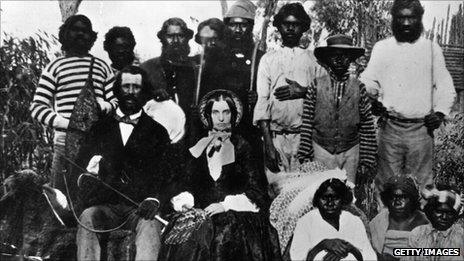Invasion or arrival?
- Published
- comments

Were the first white settlers to Australia new "arrivals" or "invaders"?
How should white settlement be characterised in the wording of the Australian constitution? The question has been raised after Sydney City Council decided to change the preamble in its corporate plan to describe the arrival of the First Fleet in 1788 as an "invasion" and "illegal colonization". It replaced the phrase "European arrival".
For many of the councillors, the issue was clear-cut. They thought it was simply historically dishonest to go on describing white settlement as anything other than an invasion, given that Australia was already home to the world's longest continuous living culture and that Aborigines were conquered and slaughtered by the British. After all, the first settlers routinely used words like "invasion," "warfare" and "enemies" when they spoke of the indigenous population.
Peter Fitzsimons, one of Australia's most read popular historians, . "Just say that next week, a flotilla came into Sydney Harbour with people and weaponry so powerful that we were powerless to resist their intent to occupy our land, and they did not even begin to recognise our ownership of it," he wrote recently. "Just say that within a few years we had been all but wiped out, with the survivors pushed to the outer regions. Here is the question, requiring an intellectually honest answer. Would that be characterised as 'an invasion', or not? We, surely, all know the answer, however uncomfortably that answer might sit."
Writing in The Guardian, the Australian journalist . He said the move "counters a cowardly movement of historical revision in which a collection of far-right politicians, journalists and minor academics claimed there was no invasion, no genocide, no stolen generations, no racism."
Others have condemned the move by Sydney Council. The Sydney councillor Phillip Black, noted: "Healing the past will not be achieved by alienating others." The New South Wales Aboriginal Affairs Minister Victor Dominello said the term invasion was divisive and thus unhelpful. "Reconciliation and progress can only be built on language that unifies us, not language that divides us," he said. The historian Keith Windschuttle, who has long claimed that the violence of white settlement has been exaggerated and who has also railed against what's called "the black armband view of history" said the council's decision "fans hostility and hatred".
The Sydney Council decision, which has echoes of the row over whether Australia Day should commemorate British colonization, has opened up a new front in the ongoing culture wars in Australia. The arguments over history have always been some of the most angry and intense, especially when they touch upon the moment when what at that time was the world's most modern culture clashed with the most ancient.
Where do you stand?